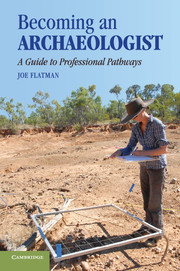Book contents
- Frontmatter
- Contents
- Tables and Figures
- Preface and Acknowledgments
- Introduction
- One What Is – and Isn't – Archaeology?
- Two Skills and Training
- Three Cultural Resource Management
- Four Academia
- Five Local Government
- Six Central Government
- Seven Public and Community Archaeology
- Conclusion
- Appendix 1 Useful Websites
- Appendix 2 Glossaries
- Appendix 3 Suggested Equipment to Take on an Archaeological Project
- References
- Index
One - What Is – and Isn't – Archaeology?
Published online by Cambridge University Press: 05 June 2012
- Frontmatter
- Contents
- Tables and Figures
- Preface and Acknowledgments
- Introduction
- One What Is – and Isn't – Archaeology?
- Two Skills and Training
- Three Cultural Resource Management
- Four Academia
- Five Local Government
- Six Central Government
- Seven Public and Community Archaeology
- Conclusion
- Appendix 1 Useful Websites
- Appendix 2 Glossaries
- Appendix 3 Suggested Equipment to Take on an Archaeological Project
- References
- Index
Summary
What Is Archaeology?
Archaeology is usually defined along the lines of “the study of past cultures through the analysis of surviving material remains”; if a historian is someone who studies surviving documents to understand the past, so an archaeologist is someone who studies instead surviving things (the formal term is “material culture”). Digging deeper, this means that an archaeologist might study, at the large scale, an entire landscape to look at traces of, say, ancient agriculture, and, at the small scale, the microscopic remains of plant pollen from a particular site in that same landscape to understand the species of plants propagated by the people who once lived there. Along the way, the archaeologist of this imaginary landscape is likely to look at a mass of other evidence, too, down to the broken pots dumped in a disused well by way of the outline of the houses in an abandoned village. It is likely, too, that the imaginary archaeologist will find evidence of trade and exchange – perhaps some worked beads made of a stone that is foreign to the study area and in fact come from only a few specific locations hundreds of miles away, perhaps even from across the sea.
In this brief picture-portrait, a host of different aspects of archaeology as a discipline, and archaeologists as a community, are touched on.
- Type
- Chapter
- Information
- Becoming an ArchaeologistA Guide to Professional Pathways, pp. 8 - 46Publisher: Cambridge University PressPrint publication year: 2011

